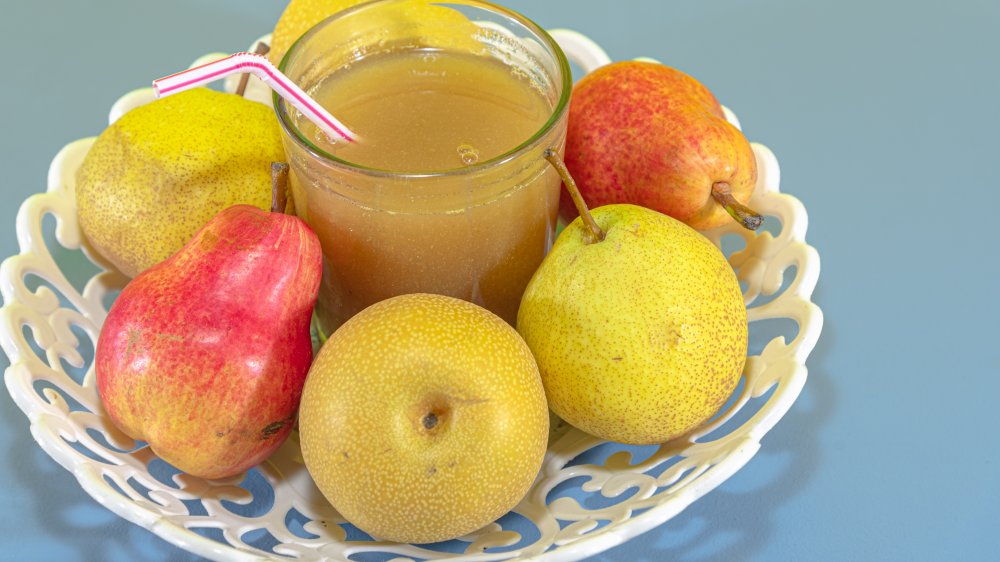When You Eat Pears Every Day, This Is What Happens To Your Body
Ralph Waldo Emerson wrote, "There are only 10 minutes in the life of a pear when it is perfect to eat." Absolute truth. And for this reason, you should seize the opportunity to add this fruit to your diet whenever you can. These curvy, symmetrical, bell-shaped fruits have a sweet, juicy, and almost grainy, silky smooth taste and texture. In fact, pears have even been nicknamed in Europe the butter fruit because of their velvety soft texture. They are great in salads, desserts, as a topping on a flat bread pizza (per Zest and Simmer), or as a simple snack. Pears are considered a fall or winter fruit, and are picked before they reach ripeness. Per Betty Crocker, this allows the tender fruit to "mellow," giving it time to become sweet, juicy, lush, and ready to devour.
Per Master Class, pears are a member of the rose family. There are over 3,000 different types of pears grown around the world to eat and enjoy. In the United States, per capita, we ate 2.92 pounds of these beautiful fruits in 2018 (via Statista), but it might be time to up this number. Whether you enjoy a pear of the D'Anjou, Bartlett, Bosc or Comice variety, pears easily rival their friend the apple in both taste and health benefits. That's right, adding this fruit to your daily diet can help you keep your body healthy and strong.
A pear a day can keep the weight at bay
We've all heard the phrase "an apple a day keeps the doctor away," but did you know a pear a day can help keep the weight at bay? That's right. By adding this yummy fruit to your daily diet, there is science that suggests it may help you lose weight. According to Healthline, a medium pear contains 101 calories, 6 grams of fiber, and these fruits are super high in water content. The combination of the water and fiber can make your tummy feel full, helping to stave off the munchies when you are trying to watch your weight. Several studies centered around the pear and weight loss have been conducted and the results suggest adding this fruit to your daily diet can indeed help shed pounds. Posted at the National Library of Medicine (NLM) is one study that took place over a 12 week period, monitoring the waist circumference of 40 adults who ate 2 pears each day. Participants lost up to 1.1 inches, showing a significant reduction in their waist-to-hip ratio. Another NLM study that followed 59 women over a 10 week period who added 3 pears to their daily menu lost on average 1.9 pounds. So, load up on pears the next time you are grocery shopping.
Pears may help promote a healthy digestive system
As Healthline notes, pears are jam-packed with rich vitamins, minerals, and antioxidants, and serve as an incredible source for both soluble and insoluble fiber. In fact, a single pear contains 22% of your daily recommended fiber intake. Half of that can be found in the fruit's skin, so don't peal this one. Fiber can keep you regular and help fight the dreaded constipation, and we can all say amen to that.
Soluble fiber is also the stuff that takes care of the good bacteria in your gut which can help keep your immune system in tip-top shape. Additionally, soluble fiber is what makes pears a low-glycemic fruit. This means when you eat one, it will not cause your blood sugar to shoot up. Amy Shapiro RD, founder of Real Nutrition, told Well and Good, "What I love about fruit — especially pears, because they're really high in fiber — is it almost acts like a broom moving through your system." Well put, and it gives us even more reasons to grab a pear and munch away so our bodies can sweep away all that waste from our digestive systems.
Daily pear consumption might help lower blood pressure, increase immune system
The benefits of daily pear consumption don't end there. Pears are rich in antioxidants, specifically, vitamin C. A pear will provide you with about 11% of your daily recommended intake of vitamin C, which can help boost your immune system, while aiding in the health of your skin and teeth. Pears are also high in flavoniods, which can fight inflammation which can also be harmful to our immune system.
Pears are also a great source for potassium. Per Eating Well, pears contain 206 mg of potassium. Well and Good notes that if you like foods of the salty persuasion, adding pears to your daily diet can help rid your body of all that sodium and ultimately may help reduce the risk of high blood pressure. Furthermore, per Medical News Today, a study conducted in 2019 took a look at how pears can influence our cardiometabolic health. Researchers had participants eat two pears each day for 12 weeks. They found that this daily consumption of the fruit resulted in a reasonable decrease in systolic blood pressure. Pears are clearly a superfood powerhouse that taste good and are good for you, and they have the potential of providing incredible health benefits when added to your daily diet.



